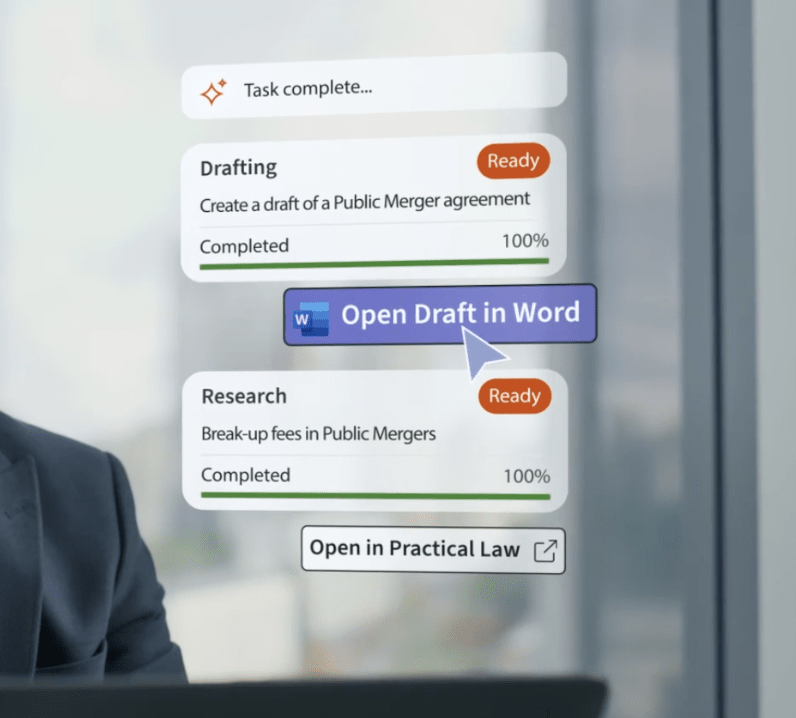A brief guide about the benefits, best practices, and risks of integrating AI into legal research to enhance efficiency, accuracy, and strategic planning.
Reviewed by Kelly Griffith, Sr. Specialist Legal Editor, Thomson Reuters
Highlights
- AI technologies enhance legal research by automating and augmenting certain discrete tasks, saving significant time, and providing deeper insights.
- Significant risks, including AI hallucinations and data privacy breaches, necessitate strict ethical guidelines and best practices.
- The most effective and ethical use of AI in law involves a human-in-the-loop approach, where professional-grade tools grounded in reliable content augment, rather than replace, an attorney's expertise and final judgment.
Artificial intelligence (AI) offers speed and accuracy, helping lawyers potentially save 240 hours per year. In this guide, explore the benefits, best practices, and risks of using AI for legal research.
Jump to ↓
Benefits of using AI for legal research
Use cases of AI in legal research
Common risks and ethical considerations
Best practices for using AI in legal research

CoCounsel Legal
AI, trusted content, and expert insights from Westlaw and Practical Law resources
Jumpstart legal research ↗What is AI legal research?
AI legal research leverages various AI technologies to automate and enhance certain tasks such as defining legal issues and finding primary sources law. AI can also extract insights from vast legal data, improving efficiency and accuracy in legal operations and analysis. AI for legal research goes beyond simple keywords and Boolean searches to help attorneys retrieve relevant answers faster, serving to augment their research, not replace it.
AI and related technology context
AI enables computers to understand, interpret, and generate human language, analyze vast quantities of legal data, and identify patterns or make predictions based on these analyses.
For example, generative AI (GenAI) is a type of machine learning (ML) that focuses on creating new content rather than just analyzing existing data. While ML allows computers to learn from data, GenAI builds on this by generating novel content like documents, images, or audio based on learned patterns.
GenAI uses natural language processing (NLP) to interact with users through language, enabling realistic conversations and the generation of new content.
Large Language Models (LLMs)are deep learning models trained on massive text and code datasets to generate human-like text based on identified patterns.
Retrieval-augmented generation (RAG) provides evidentiary support to your generated responses. RAG enables AI tools to access and integrate domain-specific content such as legal documents, contracts, case law, and other primary and secondary sources.
Unlike GenAI, agentic AI acts as an agent that can reason, plan, adapt, and act to complete multi-step workflows. For example, deep research uses agentic AI to emulate the workflow of a seasoned legal researcher with agentic AI. Deep Research in Westlaw Advantage uses Westlaw’s vast legal content and core tools to execute a multistep plan that explores every angle of your legal question.
Benefits of using AI for legal research
Curious about the advantages of using AI for legal research? Time savings, enhanced research accuracy, and access to deeper insights can help to elevate an attorney’s strategy.
For example, take a look at the types of benefits if you were to use CoCounsel Legal.
CoCounsel Legal benefits
| What you gain | Why it matters |
|---|---|
| Efficiency — Reduce time on manual workflows for case research, document review, and drafting. Integrates seamlessly with Microsoft 365, DMS, Westlaw and Practical Law. | You can reallocate hours spent on tedious, time-consuming tasks to higher-value client strategy and litigation planning. This impacts the legal team’s bottom line by increasing profitability. |
| Reliability — Tap into trusted Westlaw and Practical Law sources. Get results backed by 1,200+ expert editors. Receive citations that are easily verified. | You not only receive faster results and reliable information, but the results are grounded in exclusive Westlaw and Practical Law content. |
| Security — Built-in privacy safeguards and secure infrastructure. Constantly updated by Thomson Reuters. | Achieve competitive results without sacrificing your client’s security. This is paramount for the client who cannot have their information compromised. |
Use cases of AI in legal research
Curious to know how AI in legal research can help you in tangible ways?
AI assists attorneys for tasks such as researching statutes, regulations, case law to understand the cause of action, and — with respect to case law — how those elements have been applied in prior circumstances.
What about reviewing an opposing party’s summary judgment brief? You can ask AI to summarize an opponent’s arguments in favor of summary judgment as well as create an outline for your response citing any legal weaknesses. Conduct a search in your case files to determine if you have evidentiary support for these legal weaknesses.
The following are other specific ways that legal professionals leverage AI tools:
- Define legal issue and jurisdiction
- Find primary sources of law
- Make sure you’re using good law
- Extract key facts and legal issues
- Conduct jurisdictional survey
- Review and analyze documents such as uploaded briefs, pleadings, and contracts
- Draft legal memoranda or briefs
- Diligence and/or second pass review
Common risks and ethical considerations
AI can supercharge legal research, but it can pose some risks:
- AI hallucinations: AI has generated false citations to cases that do not exist. Attorneys from Butler Snow publicly apologized to U.S. District Judge Anne Manasco for citing two legal cases that were mistakenly generated by ChatGPT. Lawyers who rely solely on AI platforms risk losing credibility by submitting incorrect information to the court.
- Data privacy and security. If you’re using an AI platform hosted by a third-party vendor, you could violate client confidentiality if you upload case information. If safeguards cannot be verified, lawyers could jeopardize protected client information.
Best practices for using AI in legal research
Leveraging AI for research is powerful, but it should be used responsibly. The goal is to maximize the potential of AI, but also reduce risks.
Be proactive in verification
Do not assume the information is 100% accurate. If the AI tool generates a case citation, statute, or regulation, verify its accuracy just as a senior attorney would for junior associates.
Use AI to supplement
AI isn’t meant to replace human skill. Remind lawyers and staff to use traditional research methods such as key citing citations and secondary sources.
Create AI usage policy
Legal firms should develop usage policies regarding how to integrate AI into legal research. The coverage could include:
- The tools that may be used
- Confidentiality safeguards
- Reasonable billing for AI use
- Client consent protocols
- Review procedures, and
- Staff supervision
Stay up to date on rules regarding AI usage
Check the American Bar Association (ABA) material on AI ethics, state bar updates, and AI regulations.
Several state bar associations have adopted the 7 Cs approach when it comes to assessing AI — competence, confidentiality, consent, confirmation, conflicts, candor, and compliance.
The future of AI in legal research
AI is a game changer for legal research offering unmatched speeds and key insights. For instance, professional-grade tools, such as CoCounsel Legal, can help you draft faster pleadings, conduct case law analysis, and access Westlaw and Practical Law in a seamless workflow.
Even with these forward-thinking tools, human oversight is still necessary. Attorneys remain in control over legal reasoning, developing case strategy, and maintaining ethical outcomes.
Legal teams that are successfully integrating AI research tools into their research workflow will likely maintain a competitive edge among their peers.










